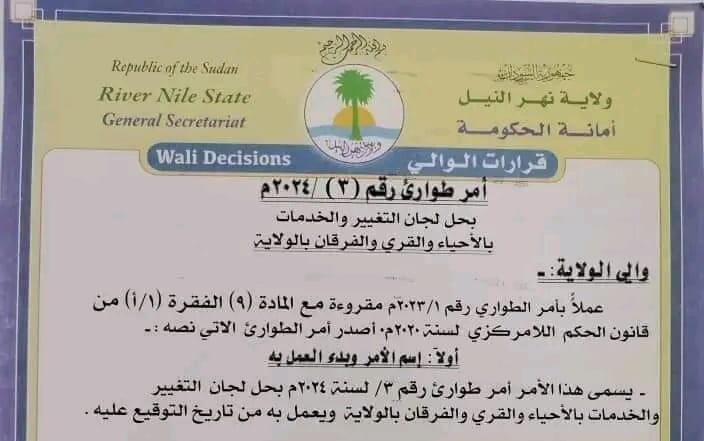Sudan River Nile gov bans FFC and resistance committees

Governor dissolves FFC, resistance, and administrative committees in River Nile state (Photo: social media)
Acting governor of River Nile state Mohamed El Badawi declared that Forces for Freedom and Change (FFC) committees, resistance committees, and administrative committees were banned and will be replaced with steering committees yesterday.
El Badawi, who was appointed following the joint coup d’état of the Sudan Armed Forces (SAF) and the Rapid Support Forces (RSF) in October 2021, issued an “emergency decree” to dissolve and ban the committees in all villages, nomad settlements, and neighbourhoods in the state. The governor ruled to form steering committees instead.
Each steering committee should consist of five to nine members. It will include an Imam of the oldest mosque, a supervisor of the “emergency situation,” a director of the locality, and representatives of women, youth, veterans, farmers, and traders in the locality.
An extra stipulation was that “those selected for the new steering committees should not have been members of the now-banned committees.”
The decree warned of strict penalties against anyone who tries to obstruct the new steering committees’ formation.
The decree follows the announcement of a large-scale mobilisation campaign to counter a possible attack by the RSF in River Nile state on December 23. The mobilisation is reportedly based on ethnic background, which caused “anger, sorrow, and sadness” in activists in Shendi and El Matamma.
Last week, the Sudanese Observatory for Human Rights noted particular concern for a statement by El Badawi “which gave members of the FFC 72 hours to leave the state.”
Commenting on the decree, lawyer El Sadig Ali said: “The resistance committees are a mass movement, and their support comes from the street. They are grassroots organisations bolstered by the popular base, not the governor or state.”
Ali told Radio Dabanga of his uncertainty that this decree will have much impact on the ground. “These decisions will have no value or impact. They will be like the statements of other stakeholders, including those of [Sudan’s Commander-in-Chief of the SAF and President of the Sovereignty Council Lt Gen] Abdelfattah El Burhan himself. They will be taken by the wind,” he said.
He said that the governor of River Nile state is improvising “in the spirit of political emotion.”
BBC journalist Mohanad Hashim, in a post on X (formerly Twitter), noted that the decree could be a “major blow” for local emergency rescue committees in the state, along with grassroots activism in general.
Kholood Khair, Sudanese think tank founder, said that these committees are “quite literally the only service providers left. The RSF, which has made significant territorial gains in the region, is expanding this rapidly “partly because SAF is busier fighting civilians than fighting the RSF,” she said.
“State authorities and the SAF have been harassing the resistance committees since their formation. It has continued throughout the war despite the resistance committees consistently fulfilling state services from healthcare (emergency response rooms) to evacuations. This is a farce,” said Sky News Africa correspondent Yousra Elbagir.
Resistance committees are decentralised and hyper-localised in their ways of operating and are mainly made up of urban youth, crossing many geographical and social boundaries of class and ethnicity.
They emerged during the 2018 December Revolution and played an incredibly important part in Sudan’s pro-democracy movement ever since. The Revolutionary Charter for Establishing People’s Power, which regulates the work of the resistance committees, was due to be signed in its final form in January 2023.











 and then
and then